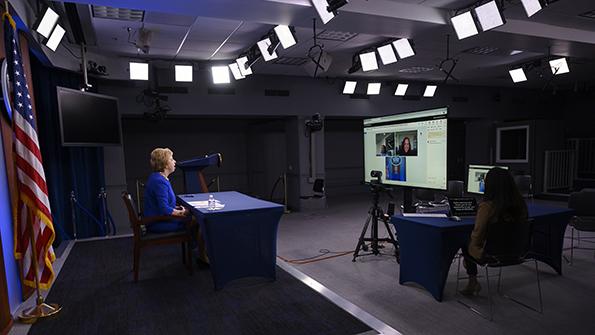
Ask the Editors: The Aviation Week Network invites readers to submit questions to our editors and analysts. We’ll answer them and if we cannot, we will reach out to our wide network of experts for advice.
What does the current Pentagon leadership team want to achieve with the time it has remaining before the Biden administration takes office in January?
Aviation Week Executive Editor for Defense and Space Jen DiMascio answers:
Pentagon Editor Lee Hudson put this question to Ellen Lord, the Pentagon’s acquisition chief, during the American Institute of Aeronautics and Astronautics Ascend conference on Nov. 18. According to Lord, she is focused on protecting the supply chain and helping the acquisition system adapt to acquire software.
Lord is working to protect the supply chain in two primary ways:
• One is to protect companies critical to national technologies from investment by adversaries.
• The other is to protect the supply of rare metals used to make microelectronics.
The Pentagon has been working with the U.S. government’s Committee on Foreign Investment, which reviews foreign transactions in the U.S. for national-security implications to “block or undo a lot of transactions” in which adversaries are buying critical U.S. technologies or real estate adjacent to military installations, Lord says.
Rather, the Pentagon is trying to partner with companies that can help the U.S. increase its technological and economic security. To that end, the Defense Department is building an electronic marketplace that Lord compares to a dating app—to match clean investors with companies building defense technologies. “We’ve practiced this in some different one-off events,” Lord says, “but we are literally just going through federal paperwork right now to launch this in December.”
A related matter is lessening the U.S. dependence on countries like China for rare minerals such as those used in the microelectronics industry. “COVID has shown us that we cannot have dependencies on non-allies and partners and makes sure that we get the supplies we need when we need them,” Lord says.
The Pentagon has a real need for radiation-hardened micro-electronics for its space-industrial base and nuclear enterprise. “Although we developed over 50% of the intellectual property around micro-electronics domestically, the bulk of manufacturing and almost all packaging and testing are conducted offshore. That just does not lead us in a place where we have a secure and resilient microelectronics industrial base,” she explains.
And finally, Lord aims to continue to roll out tools for the acquisition workforce to incorporate iterative software development into the way it works. “We know that, if you do software correctly, it’s a constant iteration of development, production and sustainment,” she adds. “We don’t want to be constrained by different budgets and get into too much [of an] administrative hurdle. We’ve tried to be very innovative on the business side.”





